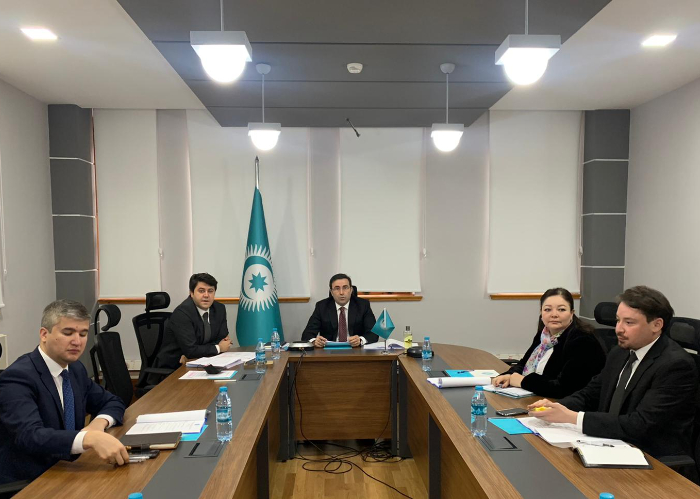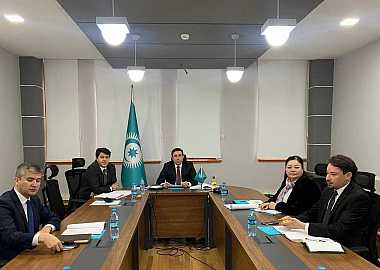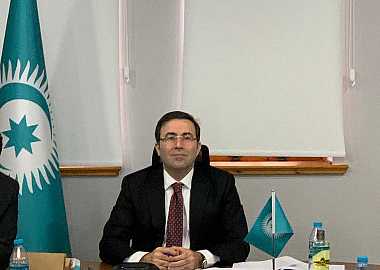9th Transport Working Group Meeting of the Turkic Council convened on a virtual format on 4 February 2021 with the participation of officers of the Ministries of Transport, Customs Authorities, Seaports, Road and Railway authorities, as well as private sector representatives carrying out transport operations across Trans-Caspian Transport Corridor.
Moderating the meeting, Deputy Secretary General of the Turkic Council Gismat Gozalov emphasized the crucial role that transport plays in the socio-economic development of the Member States. He also expressed that the Member States have placed a huge emphasis on enhancing the transport cooperation among the Turkic Council Member States and on rendering the Trans-Caspian Transport Corridor passing through the member countries an efficient and sustainable route in East-West trade.
Parties discussed the measures necessary to be taken to facilitate transport and transit operations (road, railway, sea) among the Member States, developing multimodal transport systems along the Trans-Caspian route, deepening cooperation among the Turkic Council Sister Ports, and exchanged views on ways to demonstrate the advantages of the Trans-Caspian corridor to the world.
For that matter, experts from the Member States held in-depth discussions on the “Agreement on International Combined Freight Transport among the Member States of the Cooperation Council of Turkic Speaking States” which is planned to be concluded at the 8th Summit of the Turkic Council in Turkey, and decided to establish a sub-working group to step up the efforts to finalize the draft Agreement. They further considered the “Road Demonstration Tour (Road Trade Caravan)” planned to be conducted across the Trans-Caspian route to showcase the viability of the corridor to the world. Parties talked about the technical features and timing of the Road Demonstration Tour and agreed that conducting field visits to Khorgos Logistic Centre and Checkpoint Irkeshtam, where the tour is planned to begin inbound to Istanbul, with a group of road transporting companies to would be beneficial before launching the tour.
Turkish side informed that Mersin Port of Turkey with its strategic position on the coast of Mediterranean will take part in the Sister Ports process of the Turkic Council, a decision that will boost the ongoing cooperation among the ports. Parties further discussed ways to benefit from the Sister Ports in the transportation of their foreign trades by means of exercising mutually beneficial discounts and privileges. They reiterated their willingness to hold the 4th Sister Ports meeting in Samsun Port in 2021 to carry forward their ongoing partnership.
Parties also touched upon the immediate measures needed to be put into action to phase out administrative barriers (like quotas, additional permits, transit-pass fees, Ro-Ro prices, irregular Ro-Ro operations, visa issues, etc.) in the way of efficient and seamless transport in the Trans-Caspian Corridor. International Transporters’ Association of Turkey (UND) shared its first-hand assessments concerning the existing impediments in road transportation in the Trans-Caspian corridor, along with tangible suggestions to overcome them.
Turkish representative made a presentation on the implementation of the E-Permit Project and briefed the participants on the experience of Turkey in this field, as well as on the ongoing pilot project between Turkey and Uzbekistan in the very field. Turkish side expressed its readiness to multi-lateralize the E-Permit initiative under the Turkic Council in the upcoming period.
Parties agreed that the Transport Coordination Committee at the level of Deputy Ministers as well as the 5th meeting of Ministers of Transport of the Turkic Council would meet in 2021 to take concrete action on the abovementioned agenda items.
Moderating the meeting, Deputy Secretary General of the Turkic Council Gismat Gozalov emphasized the crucial role that transport plays in the socio-economic development of the Member States. He also expressed that the Member States have placed a huge emphasis on enhancing the transport cooperation among the Turkic Council Member States and on rendering the Trans-Caspian Transport Corridor passing through the member countries an efficient and sustainable route in East-West trade.
Parties discussed the measures necessary to be taken to facilitate transport and transit operations (road, railway, sea) among the Member States, developing multimodal transport systems along the Trans-Caspian route, deepening cooperation among the Turkic Council Sister Ports, and exchanged views on ways to demonstrate the advantages of the Trans-Caspian corridor to the world.
For that matter, experts from the Member States held in-depth discussions on the “Agreement on International Combined Freight Transport among the Member States of the Cooperation Council of Turkic Speaking States” which is planned to be concluded at the 8th Summit of the Turkic Council in Turkey, and decided to establish a sub-working group to step up the efforts to finalize the draft Agreement. They further considered the “Road Demonstration Tour (Road Trade Caravan)” planned to be conducted across the Trans-Caspian route to showcase the viability of the corridor to the world. Parties talked about the technical features and timing of the Road Demonstration Tour and agreed that conducting field visits to Khorgos Logistic Centre and Checkpoint Irkeshtam, where the tour is planned to begin inbound to Istanbul, with a group of road transporting companies to would be beneficial before launching the tour.
Turkish side informed that Mersin Port of Turkey with its strategic position on the coast of Mediterranean will take part in the Sister Ports process of the Turkic Council, a decision that will boost the ongoing cooperation among the ports. Parties further discussed ways to benefit from the Sister Ports in the transportation of their foreign trades by means of exercising mutually beneficial discounts and privileges. They reiterated their willingness to hold the 4th Sister Ports meeting in Samsun Port in 2021 to carry forward their ongoing partnership.
Parties also touched upon the immediate measures needed to be put into action to phase out administrative barriers (like quotas, additional permits, transit-pass fees, Ro-Ro prices, irregular Ro-Ro operations, visa issues, etc.) in the way of efficient and seamless transport in the Trans-Caspian Corridor. International Transporters’ Association of Turkey (UND) shared its first-hand assessments concerning the existing impediments in road transportation in the Trans-Caspian corridor, along with tangible suggestions to overcome them.
Turkish representative made a presentation on the implementation of the E-Permit Project and briefed the participants on the experience of Turkey in this field, as well as on the ongoing pilot project between Turkey and Uzbekistan in the very field. Turkish side expressed its readiness to multi-lateralize the E-Permit initiative under the Turkic Council in the upcoming period.
Parties agreed that the Transport Coordination Committee at the level of Deputy Ministers as well as the 5th meeting of Ministers of Transport of the Turkic Council would meet in 2021 to take concrete action on the abovementioned agenda items.










